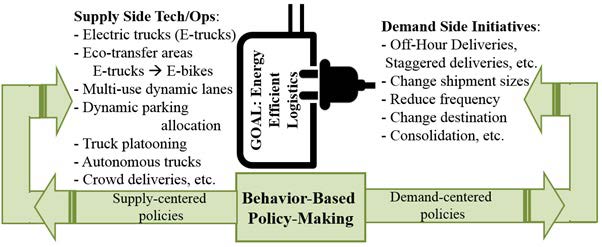United States - European Commission Urban Freight Twinning Initiative: Compendium of Project Summaries, Volume II
Overview of 2018-2019 International Urban Freight Roundtables
| Research | Policy | Pilot | United States |
Collaborative Approaches to Foster Energy-Efficient Logistics
The goal of the project is to foster the adoption of Energy Efficient Logistics (EEL) along the supply chains operating in the Albany-New York City (NYC) corridor in a way that benefits the range of stakeholders and agents involved in, and affected by, those supply chains. The project aims to fully exploit the potential of collaborative approach between the carriers, shippers, and receivers. The strategy is to induce carriers to adopt energy efficient Technologies and Operations (Tech/Ops), and induce shippers and receivers to change their demand patterns to exploit the synergies with Tech/Ops and achieve EELs. A selected group of EEL initiatives will be pilot-tested in the Albany-NYC corridor, which is the project’s living lab, to gain insight into the barriers and obstacles for EELs, identify ways to overcome those barriers, and demonstrate the real-life power of EEL initiatives to stakeholders.

Energy-Efficient Logistics diagram.
Source: Rensselaer Polytechnic University.
Project Types
Research, Policy, Pilot.
Period of Performance
October 2017 - September 2020.
Project Site
Corridor between Albany, New York and New York City, New York, USA.
Contact
José Holguín-Veras
Professor
Rensselaer Polytechnic University
Troy, New York
JHV@rpi.edu
(518) 276-6221
Topics Addressed
- Air quality/environment.
- Economic competitiveness.
- Energy consumption.
- Livability/quality of life.
- Logistics/distribution.
- Mobility/congestion.
- Modeling.
- Supply chains.
Expected Outcomes
The key outcomes of the project will be an energy management guidebook with actionable information and a practice-ready approach to foster EEL initiatives at the city, Metropolitan Planning Organization (MPO), and State levels and a comprehensive set of analytical tools to enable professionals to assess how policy measures will influence the behavior of the supply chain participants and their demand patterns and, ultimately, freight energy use.
Stakeholder Involvement
The project has an Industry Advisory Group (IAG) and an Agency Advisory Group (AAG). These groups provide guidance to the team and will collaborate in outreach. Some key members of the IAG and AAG are Price Chopper, GE Global Research, the Capital District Transportation Authority, and the Albany Port District Commission.